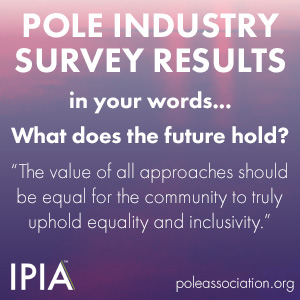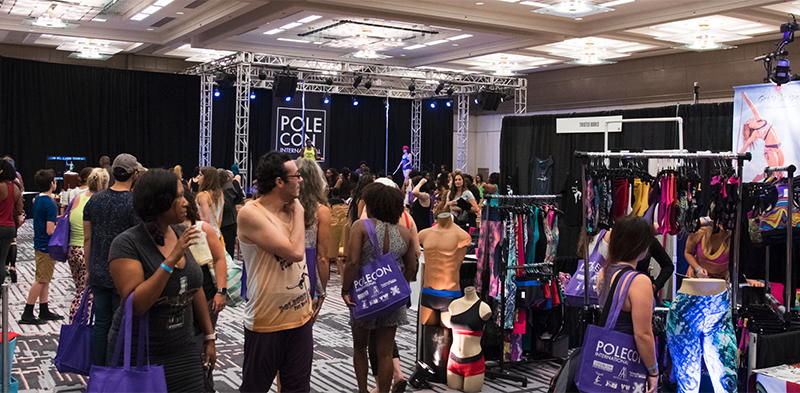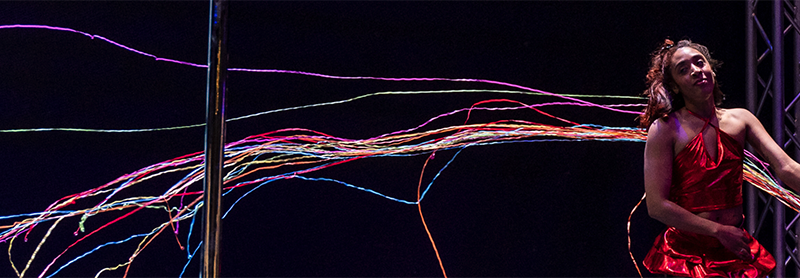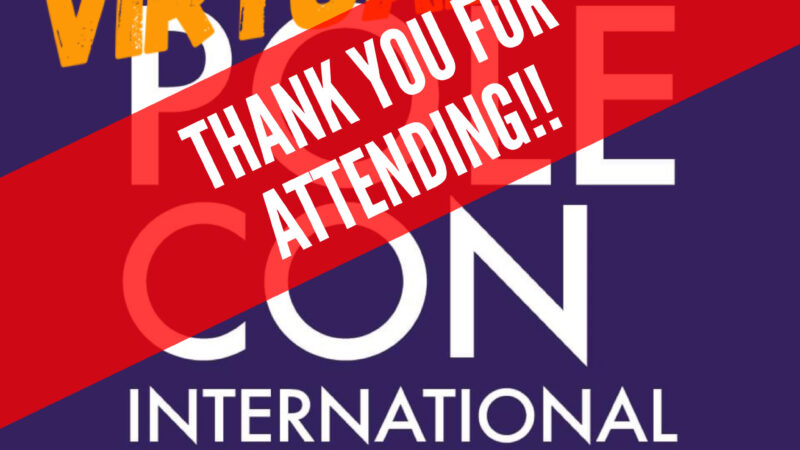Starting for the 2025 PoleCon event, PoleCon and the IPIA is offering three needs-based grant…

Results from the first Pole Industry Survey
The results from our first pole industry survey are in!
…And as to be expected in a complicated industry like ours, many of the results are conflicting.
The IPIA is the first trade association for the pole industry. As such, it can help pole businesses become more successful, sustainable, and inclusive by promoting education, fostering collaboration, and by developing and promoting standards for matters of common interest.
It is important to also note that just because we started a trade association does NOT mean that we actually represent the industry as a whole at this time. To our knowledge, there is no one governing body or one business of any sort that can claim to represent all of pole or even one whole aspect of pole, such as pole businesses or pole competitions. It is our hope that the IPIA can continue providing relevant educational resources, which may include recommendations for guidelines, policies, and standards that support the industry and help it grow. It is our hope that we can continue to host important discussions through our events and other actions like this survey.
We did not ask respondents for personal identifier(s) to be able to group responses together to potentially see themes across specific demographics. As such, we received conflicting responses (in some cases that were in literal opposition) reflecting that pole is NOT universally experienced.
Results of the Survey (and Comments)
Most respondents who took the survey consider themselves to be hobbyists.
This is interesting because these are our pole business customers. Their opinions are important to consider but may not represent the full picture of the fundamental interior business issues in the industry because they simply don’t know them like a business owner would.
The fewest respondents who took the survey consider themselves to be sex workers. This is also worrisome as they are the group within our industry that is most marginalized by current regulations and demonstrates the continued rift in the industry.
Despite the issue of having fewer sex workers (than other demographics) respond overall, many respondents overall did cite that they wanted the industry to become more sex worker friendly and less whorephobic overall:
- “Needs to become more sex worker friendly.”
- “I hope that we’re able to more properly give credit to and support sex workers as a whole community, not just a select few.”
- “It would be great to no longer have discussions as to why the ‘not a stripper’ attitude is problematic. I’m in the scene 15 years and that attitude has been there since day 1, it’s nothing new and frankly I’m astonished it’s still something that needs to be talked about. So, my wish is that all studios and instructors will get on board with this.”
Most respondents cited “financial” as the biggest challenge they face personally. Comments referenced COVID restrictions with some saying those restrictions closed studios, while at least one respondent said the restrictions had a positive impact on them financially. Some cited the cost of taking classes.
Respondents on the question of “what is the biggest problem the industry as a whole faces” was mixed. Outward facing issues was number one, followed closely by inclusivity and financial.
What does the future have in store?
Many people were positive about the industry continuing—and even growing—in the next five years, although a few were concerned that our industry was in decline, either from COVID-related issues or other issues:
- “I’m not sure anymore, especially after all of the negativity with certain professionals in this industry.”
- “If it stays the way it is, it will decline. The industry needs to become more progressive towards fixing issues inside the industry before changing the outward issues.”
- “More body privileged white men and women profiting off of everyone else.”
There was no clear theme of how we grow, even as many people cited pole going “mainstream” as where they saw the pole industry going in five years. A clear (and continued) dichotomy emerged around whether pole was fitness or some form of art/dance with or without explicit ties to sex work:
- “Mainstream growth. I hope that can include dues to sex workers and more inclusive environments.”
- “I’m hoping we will get back to our sex industry roots and move away from the fitness industry.”
- “Addition of pole fitness to traditional gym settings with a decrease in the importance of the art of dance.”
- “I feel and fear that erasure for erotic style/sex work will continue and pole ‘fitness’ will take over.”
- “Hopefully it’s more recognized as a legitimate alternative fitness activity.”
- “I hope that it continues to push forward to more fitness and less stripper association.”
- “I can see it becoming more and more bubble gum and whitewashed, which I do not want to happen. We will need to work hard to spread the message that sexuality is ok and that sex workers should be celebrated within the community. We should be embracing the sexy side of pole, not running away from it.”
Overwhelmingly, in comments about the future of our industry, respondents cited inclusivity and visibility across the entire spectrum of genders, body types, race, and more as critically important.
- “I think the industry has a lot of stigma to overcome, and a lot of work to do inside itself to be in a strong position to advocate to overcome that stigma from a place of integrity.”
- “The value of all approaches should be equal for the community to truly uphold equality and inclusivity.”
Other Themes Emerged
In the comments across all questions, two other major themes emerged.
One theme was around instruction, which addressed having clear instruction and leveling but also acknowledging that current certifications may not be accessible/applicable/available or event-appropriate for everyone:
- “We need guidelines for instructors. There are some terrible instructors out there – and some of them are well known pole ‘stars.’ Being a good dancer does NOT make you a good instructor.”
- “More regulated. More people wanting certifications. Need for training centers or instructor training. How to be a good instructor or a place where new instructors can shadow/intern etc.”
- “Growing! I’d love to see it as a whole have more knowledge and/or resources for instructors. A network for growth, sharing skills, mentorship for new instructors. (Network for offering/searching for instructor to workshops and teach at other studios).”
- “Uncertified and unqualified instructors and owners putting the safety of clients at risk.”
- “More teaching courses for people with little to no background. There are nowadays ‘certificates’/’training’ for aerial dance that anyone can do in a week… So now we have former dance teachers, personal trainers (who have no idea how to safely spot, how to perform, how to…) teaching aerial at regular dance schools, regular gyms…”
The other theme was around the current social media climate and cyber bullying, both internal to our industry and external from entities like Instagram/Facebook:
- “The amount of bullying, calling out, cancel culture behavior is out of control.”
- “Social media censoring.”
- “The cattiness the in fighting; I’m just done with it all.”
- “As the industry has grown…it has grown apart. The industry spends too much time focused on the negative as of late…instead of the overall positive impact we have on people’s lives.”
COVID Concerns
When crafting the questions for this survey, we originally included a COVID question but ultimately removed it to simplify the survey and keep it more general, knowing that COVID restrictions and experiences vary widely around the world. From the comments, COVID concerns are still very much an issue from financial concerns to concerns about safety in class. On a positive note, many expressed hope that online instruction continues.
IPIA Actions
To support our industry based on the findings of this survey, there are some immediate actions the IPIA will support, either through continued action or new action and some actions that require additional study and engagement with the industry.
External issues are challenging to focus on as they deal with a complicated and diverse set of issues, like cultural and societal perceptions, which are challenging to solve directly and consistently for persons around the globe. To best assist the industry, we will focus on issues internal to the industry for the immediate future.
Immediate IPIA Actions:
- Keep prices for education low — $5 for non-member webinars and free for members. Most of the resource articles that provide information on how to start or improve a business are free.
- Continue to negotiate for additional discounts from businesses/organizations outside of the pole industry that are relevant to the pole business industry, such as those that support education or business infrastructure.
- Run another Virtual PoleCon event (the first was October 2020) focused on the pole business community to support educational resources, the ability to network and recognize that virtual gatherings will continue to be more accessible than in-person (regardless of COVID restrictions). More information on this soon.
Future IPIA Actions:
- Investigate how to support pole business efforts to improve inclusivity.
- Investigate how to engage more members of the pole business community, including sex workers.
- Launch further surveys and group discussions to do “deep dive” questions on issues from the survey (original issues and new issues).
Thank you, everyone who took the time to answer the survey and provide your unique experiences with the pole industry!
Thank you to Kate Garcia who used their data analysis skills to help us analyze this data.
The information from the survey will help support the entire pole industry, and as one respondent eloquently said: “I believe, if we worked together, the pole industry could be a far more inclusive place.”



